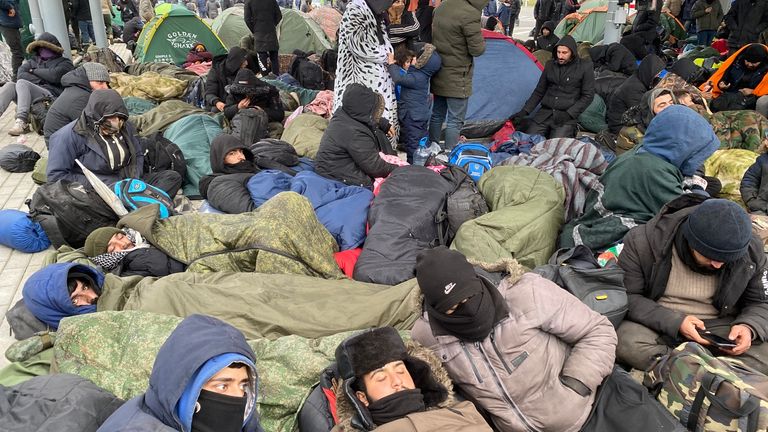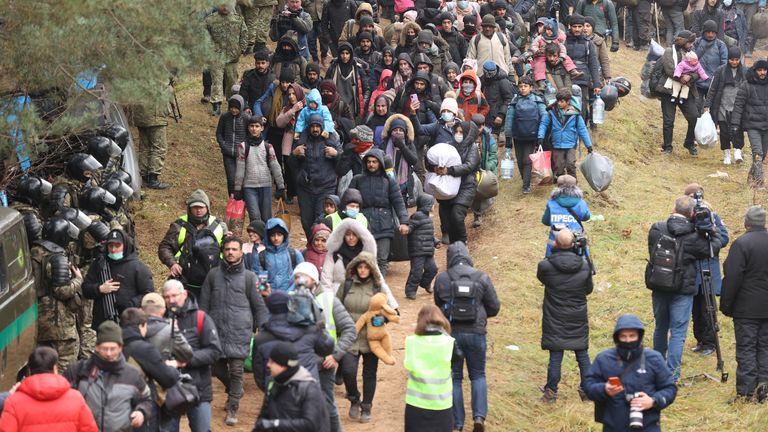The European Union has tightened its sanctions against Belarus over the migrant crisis at its border with Poland, but has been told it must do more - including standing up to Russian President Vladimir Putin.
The warning came from Lithuanian foreign minister Gabrielius Landsbergis, whose country is one of three EU nations that share a border with Belarus.
Mr Landsbergis is pushing for tougher action, including sanctions specifically outlawing the use of Minsk airport.
He has made little secret that his government holds Mr Putin at least partly responsible for stoking the dispute.
"I fully agree that he is driving this crisis, together with [Belarusian president] Alexander Lukashenko," he told Sky News.
"Politically that is for certain, and I am very worried about the possible notion that some people see Putin as part of the solution. I would never see him as part of the solution - he's part of the problem, and that has to be stated very clearly."
On the new sanctions, he said that any future packages needed to create more impact, and suggested greater focus.
He said sanctions on the Belarusian tobacco industry had restricted access to filters and rolling machines but had not actually included any sanctions on tobacco itself.
Instead, Mr Landsbergis said he wanted to see sanctions placed on Belarus's main airport, in Minsk, to stop airlines from landing in the country, and bringing in more would-be migrants.
Lithuania, Poland, and Latvia all share a border with Belarus and each have watched the growing number of people who have flown into Belarus recently, only to attempt immediately to cross a border into a neighbouring nation.
Mr Lukashenko, who is considered an illegitimate and dictatorial leader by the EU, is accused of luring thousands of migrants to Belarus with the promise of easy passage to the EU, and particularly to Germany.
Belarus has organised visas and flights for people coming from a range of countries, as well as onward transport to the border areas, resulting in thousands of people attempting to cross into other countries. However, the three EU nations have each refused to allow any crossings.
Follow the Daily podcast on Apple Podcasts, Google Podcasts, Spotify, Spreaker
Mr Lukashenko's victory in last year's presidential election was considered a triumph of vote-rigging and intimidation, and he has subsequently faced a range of sanctions, which extend to his supporters and to the wider Belarusian economy.
His decision to direct so many migrants to the border region is widely considered to be an act of revenge, albeit one supported by Mr Putin.
It is the role of the Russian leader that troubles a number of countries, including Lithuania.
Mr Landsbergis said it was possible "that Ukraine could be attacked while we are dealing with the Belausian border".
But he added that his greater concern was the prospect of Russia moving troops into Belarus, nominally to prop up a volatile security situation.
"We could see a very much increased military presence that could be permanent in the territory of Belarus," he said.
"Putin can go either way. What we might see one day is that Belarusian border guards would be replaced by Russian FSB guards.
"The signal has to be clear that we are seeing this. We know that there are Russian military troops on the border and that Russian special troops landed in Belarus.
"If we see them acting in the escalation, then they would have to answer for that."
His country, like Poland, is now committed to building a barrier along its border with Belarus, and is appealing to the EU to contribute to the cost of this.
It is a demand that has received a mixed response so far. European Commission President Ursula von der Leyen has said she does not want to spend money on fences and barbed wire, while her European Council counterpart, Charles Michel, appears more receptive.
But in the border region, as temperatures continue to drop, there appears to be no imminent solution to the stand-off.
The forests of Belarus are home to a growing number of migrants, housed in makeshift and rudimentary camps, caught between a nation that summoned them and parked them at the border, and countries that don't want them to enter.
https://news.google.com/__i/rss/rd/articles/CBMicmh0dHBzOi8vbmV3cy5za3kuY29tL3N0b3J5L3BvbGFuZC1iZWxhcnVzLWJvcmRlci1ldS13YXJuZWQtaXQtbXVzdC1zdGFuZC11cC10by12bGFkaW1pci1wdXRpbi1vdmVyLWNyaXNpcy0xMjQ2OTQ5MdIBdmh0dHBzOi8vbmV3cy5za3kuY29tL3N0b3J5L2FtcC9wb2xhbmQtYmVsYXJ1cy1ib3JkZXItZXUtd2FybmVkLWl0LW11c3Qtc3RhbmQtdXAtdG8tdmxhZGltaXItcHV0aW4tb3Zlci1jcmlzaXMtMTI0Njk0OTE?oc=5
2021-11-15 18:11:15Z
1154445618





Tidak ada komentar:
Posting Komentar